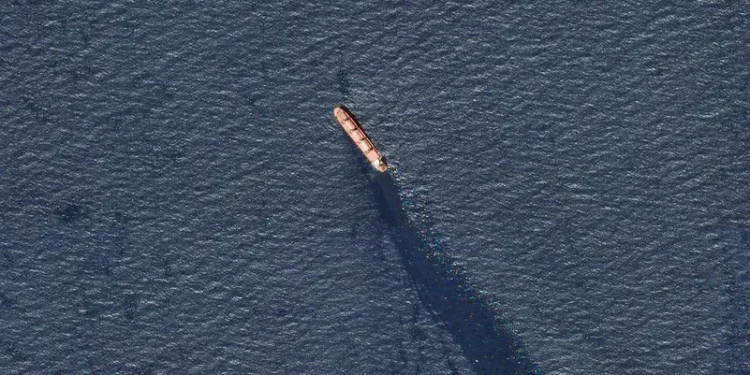An environmental calamity is unfolding in the Gulf of Aden, where a cargo ship, the Rubymar, has been left abandoned and is taking on water following an attack by Yemen’s Houthis. This incident, which occurred on a Sunday, has led to the release of a substantial oil slick, spanning 18 miles, as reported by the US Central Command on Friday. The situation poses a significant threat to marine life and the broader ecological system in the area, with concerns that it could deteriorate further.
The Belize-flagged, British-registered, and Lebanese-operated vessel was transporting combustible fertilizer when it fell victim to a missile strike by the Iran-backed militant group. The strike caused considerable damage, leading to the evacuation of its crew to Djibouti. According to the Blue Fleet Group, which operates the Rubymar, one missile compromised the ship’s hull, allowing water to flood the engine room and causing the stern to sink noticeably. Although a second missile struck the deck, it did not result in major damage, as detailed by Blue Fleet CEO Roy Khoury in discussions with AFP.
Currently, the Rubymar is anchored but continues to sink slowly. The cargo, exceeding 41,000 tons of fertilizer, poses a significant risk of spilling into the Red Sea, which would exacerbate the ongoing environmental disaster. Plans are underway to tow the ship to Djibouti within the week, as indicated by the ship’s operator. Despite the precarious situation, Khoury remains optimistic, stating that the vessel is still afloat, with recent images showing its stern submerged. When questioned about the potential for sinking, Khoury acknowledged the possibility but noted there was “no risk for now.”
This attack on the Rubymar marks the most severe damage inflicted on a commercial vessel since the Houthis began targeting shipping lanes in November. Their campaign, they claim, is in solidarity with Palestinians in Gaza amid the Israel-Hamas conflict. The increased risk has led some shipping companies to reroute their vessels around southern Africa, avoiding the Red Sea—a crucial passage that normally accommodates about 12 percent of global maritime trade. This shift has had significant implications for international commerce, with the UN Conference on Trade and Development reporting a more than 40 percent drop in traffic through the Suez Canal over the previous two months.



























